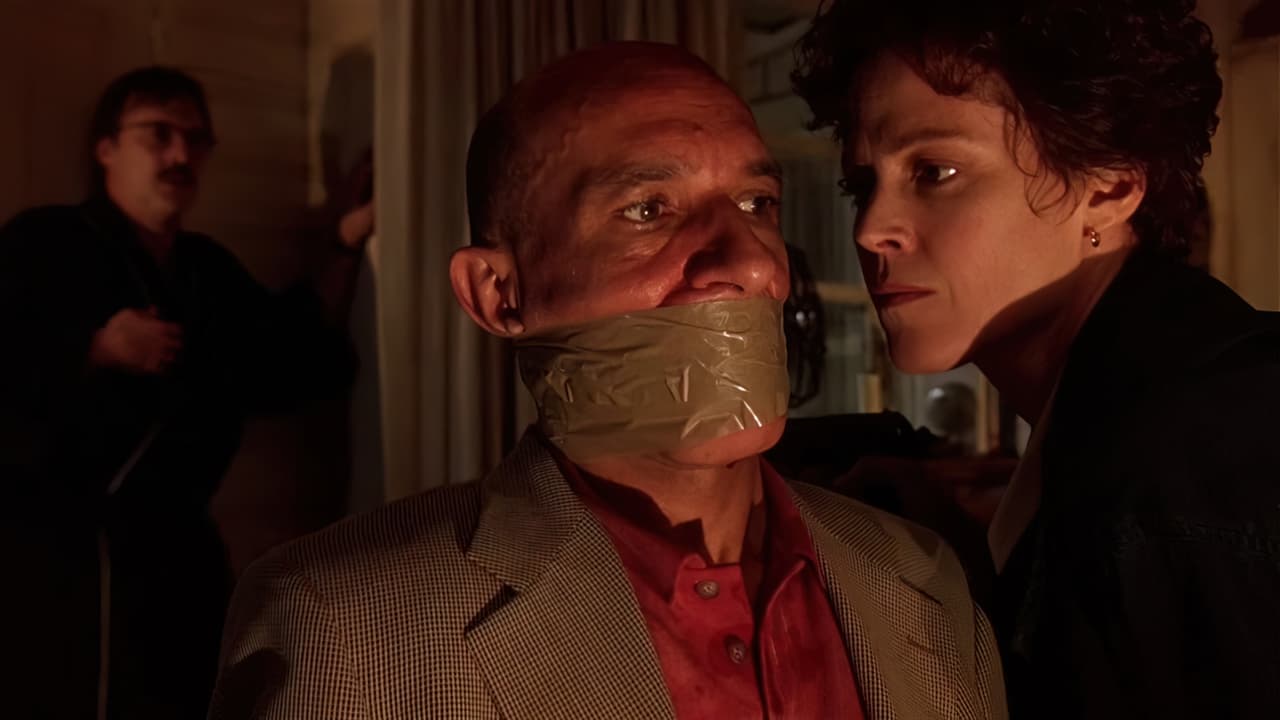

Roman Polanski does something that is not easy here: he transfers a play to the screen, and never lets you forget that it is a play you're watching, but he makes it completely cinematic at the same time. The play itself is a great enigma about truth, doubt, vigilantism and justice. I don't want to give away the ending, but it is masterfully designed and executed. It's an intense and compelling film, the kind that invites long debates after it's over. The three leads are perfectly cast: Weaver and Kingsley are at the peak of their powers, but Wilson is much more than just "a third wheel". *** out of 4.
... View MorePaulina Escobar (Sigourney Weaver) and her lawyer husband Gerardo (Stuart Wilson) live in a remote home in a South American country still dealing with its recent dictatorship. Paulina is on edge haunted by the torture she suffered. One stormy night, Gerardo gets a ride home with neighbor Dr. Roberto Miranda (Ben Kingsley). Paulina recognizes his voice as that of her unseen tormentor and she takes him prisoner. Gerardo tries desperately to talk her out of the situation and agrees to be the man's defense lawyer as she tries him in her trial.It's a three-person play and everybody delivers. Weaver is amazing and Wilson is great. There are simply no words to describe Kingsley. Director Roman Polanski keeps the static location compelling and really relies on the actors to develop the climbing tension.
... View MoreI've seen this twice and the impact was no less the second time. It's a story about power, the abuse of it, the search for justice and relationships. I'm in awe of Weaver's acting ability. Yes, it's a great role but she makes it that. She is a queen in my opinion; she mesmerizes. And the interplay between the three actors is such that even though there are moments when it is difficult to continue watching, you cannot look away.This film shows some very real glimpses into the worst of our human nature and the deepest part of who we are in our quest for peace and resolution.
... View MorePolanski surprises again with this thriller concerning one woman's attempt to exorcise the demons of her past by brutalising a man she holds responsible for the torture she endured almost twenty years earlier. The screenplay from Rafael Yglesias and Ariel Dorfman (based upon Dorfman's play) manages to keep us guessing as to each player's next move, and as to the truth about Roberto (Kingsley).Sigourney Weaver is electric as Paulina, the woman seemingly driven to madness when confronted with this horrific ghost from her past. Her performance is at times truly terrifying. Ben Kingsley's turn as the questionable Roberto leaves no doubt as to his versatile acting talents, as he portrays with ease probable innocence, possible guilt and desperation all at once. Stuart Wilson is the unfortunate third party, and never has enough to do as the husband caught in the middle of this frightening situation. Editing from Herve de Luze is taught and cinematography from Tonino delli Colli is suitably confined.Polanski effortlessly keeps us on the edge of our seats as he at once jolts and surprises us throughout his pic. Yet in going for all out entertainment in his beloved Hitchcockian fashion, he has avoided the many contentious issues that this film raises. Gender domination, sexual assault, justice, revenge and even forgiveness are all skimmed over as Polanski charges through the subtleties of the narrative in favour of the thrill. Hey, who's complaining?Monday, June 16, 1997 - Hoyts Croydon
... View More